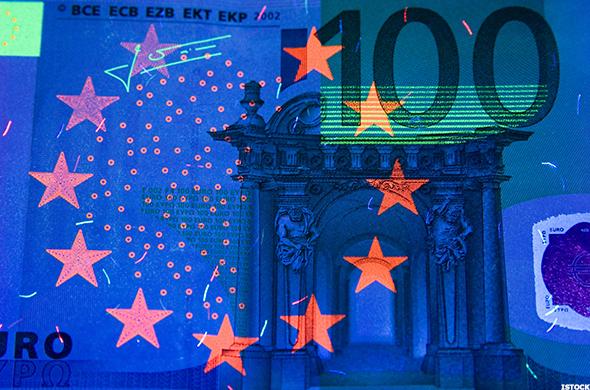Pound sterling set for all-time low against the Euro, say HSBC and UBS
There are already signs investment is being hit, with Vodafone among companies considering moving their headquarters abroad

Your support helps us to tell the story
From reproductive rights to climate change to Big Tech, The Independent is on the ground when the story is developing. Whether it's investigating the financials of Elon Musk's pro-Trump PAC or producing our latest documentary, 'The A Word', which shines a light on the American women fighting for reproductive rights, we know how important it is to parse out the facts from the messaging.
At such a critical moment in US history, we need reporters on the ground. Your donation allows us to keep sending journalists to speak to both sides of the story.
The Independent is trusted by Americans across the entire political spectrum. And unlike many other quality news outlets, we choose not to lock Americans out of our reporting and analysis with paywalls. We believe quality journalism should be available to everyone, paid for by those who can afford it.
Your support makes all the difference.When UK businessman Paul Frampton bought the spending money for his family vacation to Tuscany this month, he was astonished to be charged almost a pound for each euro he purchased.
“I was flabbergasted,” said the 41-year-old media-company boss, who paid 97 pence per euro at London Stansted Airport and blamed work commitments for having to do the deal minutes before jumping on his flight. “Airport exchanges are renowned for poor rates, but this was tantamount to daylight robbery.”
Euro-sterling parity is a reality that wholesale traders, as well as Britons traveling abroad, are going to have to get used to as soon as next year if forecasts by HSBC and UBS are to be believed.
A one-for-one exchange rate would be a first for the pound. And even with an 11 per cent slide since the Brexit vote, the UK currency is still some way from its all-time low of 98.03 pence per euro reached in the depths of the global financial crisis in 2008.
The European Union buys about half of Britain’s goods and services, and the 23 June decision to leave has hurt the pound by stirring concerns the nation will struggle to fund its record current-account deficit of 5.4 percent of gross domestic product.
There are already signs investment is being hit, with Vodafone among companies considering moving their headquarters abroad. On the other hand, a weaker currency makes the UK’s exports more competitive — even as it hurts outbound tourists.
‘Additional Pressure’
“Even before the referendum, it had become a question of, how does the current-account deficit decline?” said Themos Fiotakis, London-based co-head of currency and rates strategy at UBS, which is Switzerland’s largest bank and this month reiterated its prediction for the pound to fall to parity with the euro in 2017. “The uncertainty resulting from the vote to leave is creating additional pressure.”
The Bank of England’s response — which has included an interest-rate cut and expansion of the money supply to soften Brexit’s economic impact — has also hurt the UK currency.
The pound weakened on Friday as Theresa May’s team was said to be leaning toward the first part of 2017 as the best moment to trigger the start of formal EU exit talks. Sterling was at 86.49 pence per euro in London on Monday.
More Competitive
Vacationer Frampton, who also owns a property on the Spanish island of Ibiza and regularly transfers money there from the UK, bought his last-minute euros at a Moneycorp counter at Stansted Airport.
Moneycorp retail director Tracy Bownes said airport customers pay more because of higher operational costs. The company was charging about 99.85 pence per euro on Friday at Stansted.
Exchange rates at some money changers have already gone above a pound, with operators at Stansted and nearby London Luton Airport having charged travelers about 101 pence per euro, according to a survey published on 17 August by Caxton FX. Travelex UK, which operates in 13 UK airports, said last week it charged customers at its branches at London’s Heathrow Airport as much as 98 pence for a euro.
Distant Prospect
While euro-sterling parity may already have arrived for British tourists, in the wholesale market it would require a more than 13 percent drop in the pound. Options prices imply only a 32 percent chance of this happening within two years, while the median estimate in a Bloomberg strategist survey is for the UK currency to strengthen to 83 pence per euro by the end of 2017.
HSBC, Europe’s biggest bank, cut its sterling forecast on 8 August to predict parity with Europe’s single currency by the end of next year. It also sees the pound falling 16 per cent to $1.10, surpassing a three-decade low of $1.2798 reached in July.
“The parity level would make the UK more attractive to foreign investors,” said Daragh Maher, head of US currency strategy at HSBC, who moved to New York in 2015 after 16 years in London. At the same time, a continued slide in sterling “would also make it more expensive for people to come and visit me.”
Bloomberg
Join our commenting forum
Join thought-provoking conversations, follow other Independent readers and see their replies
0Comments